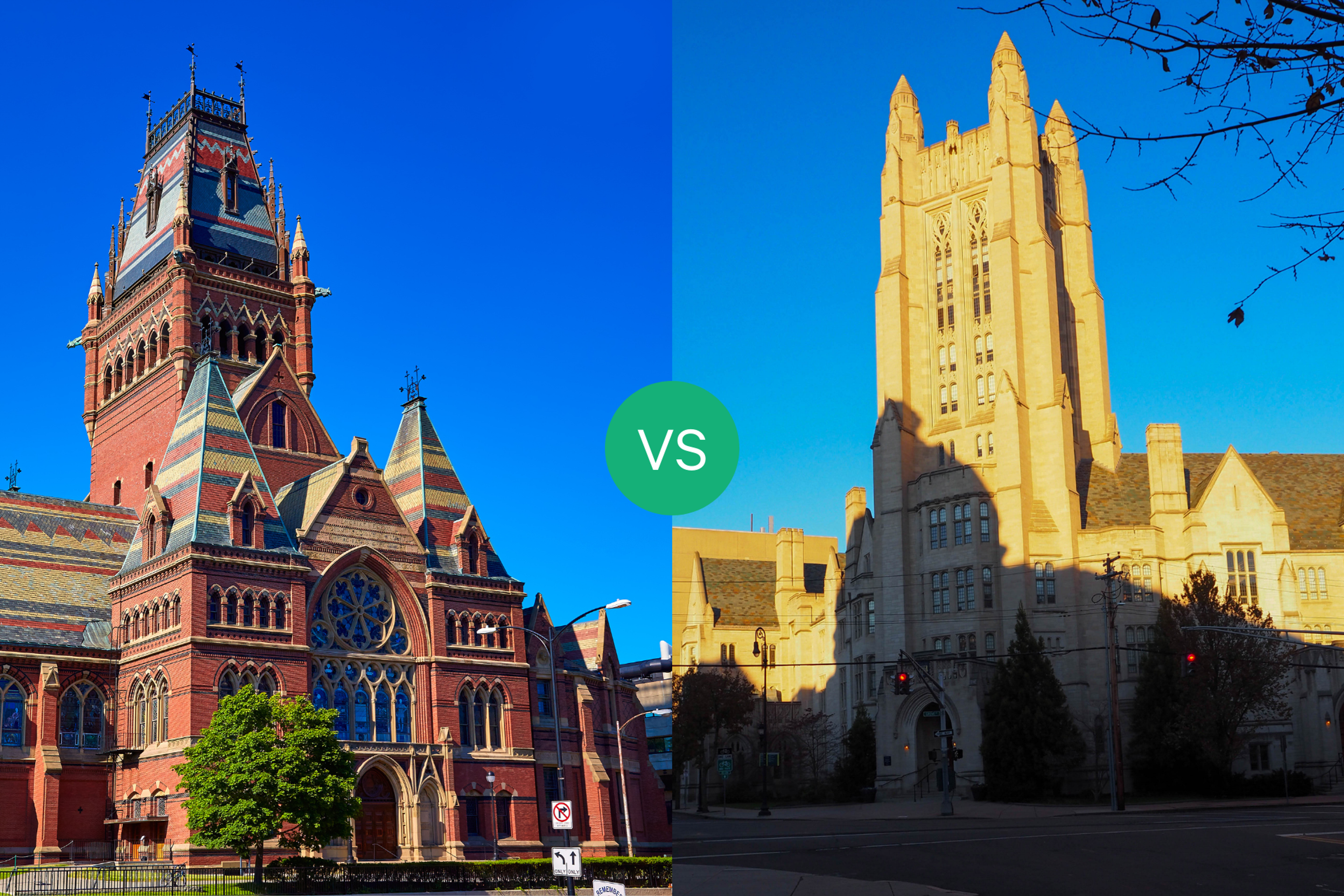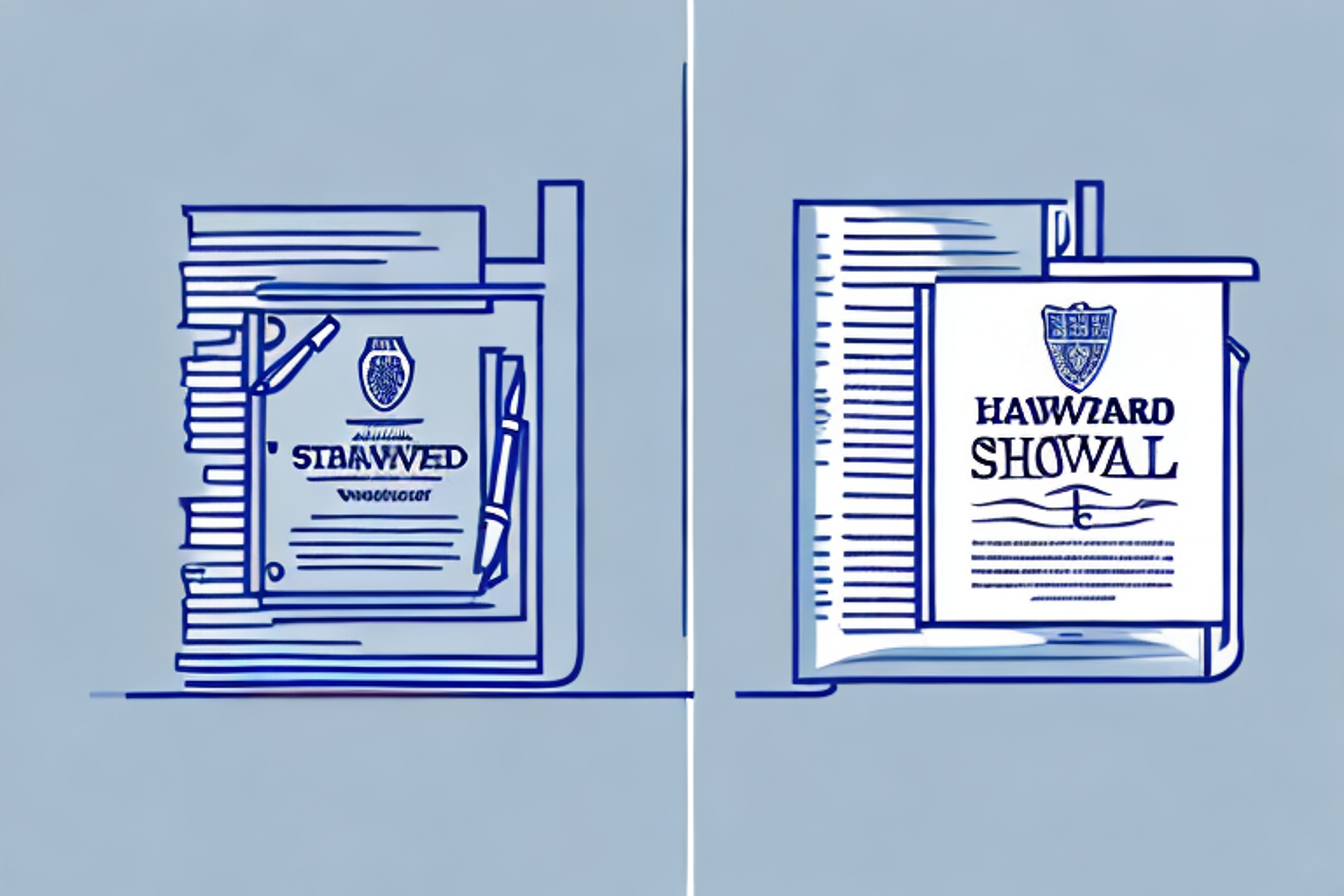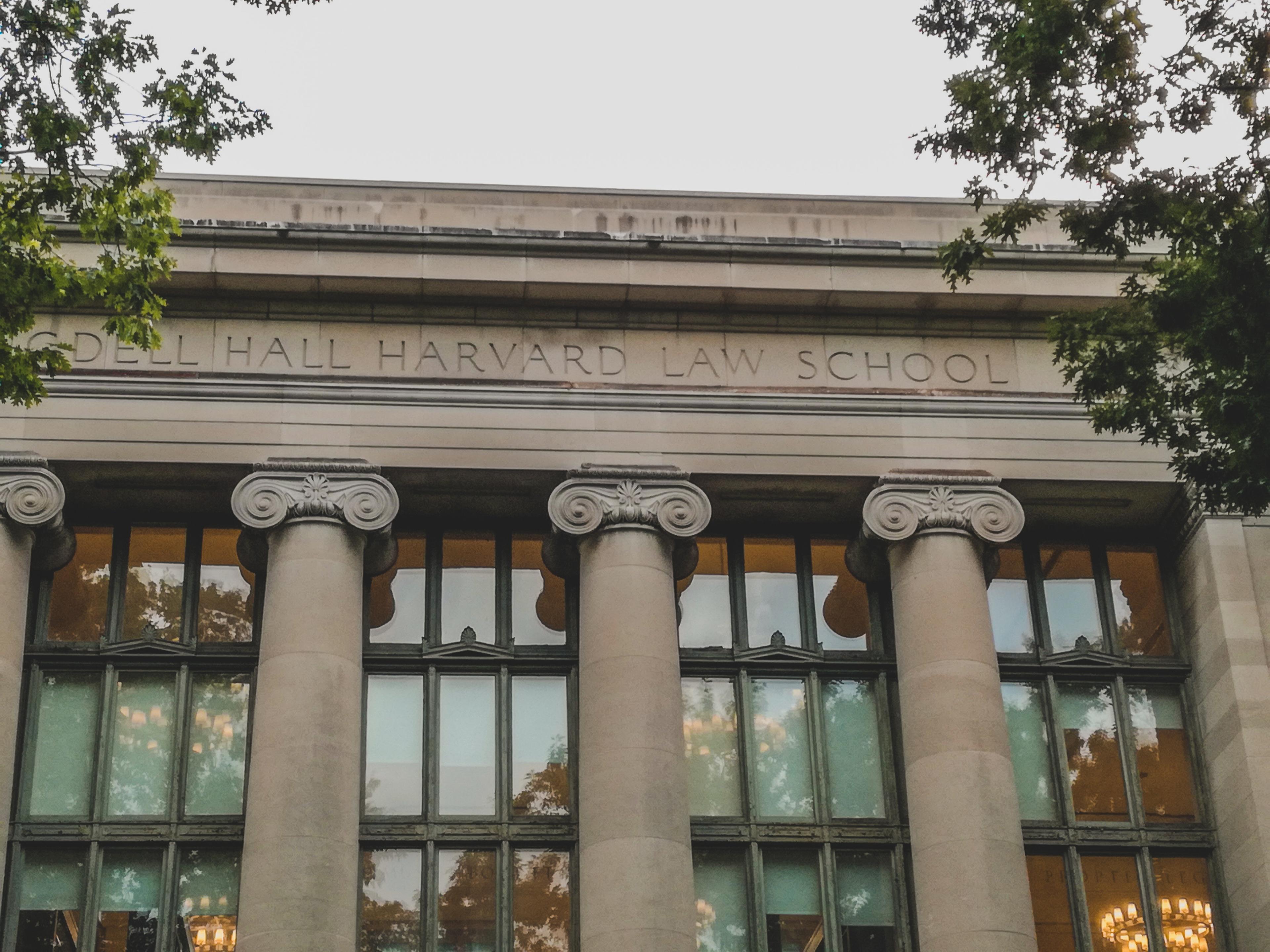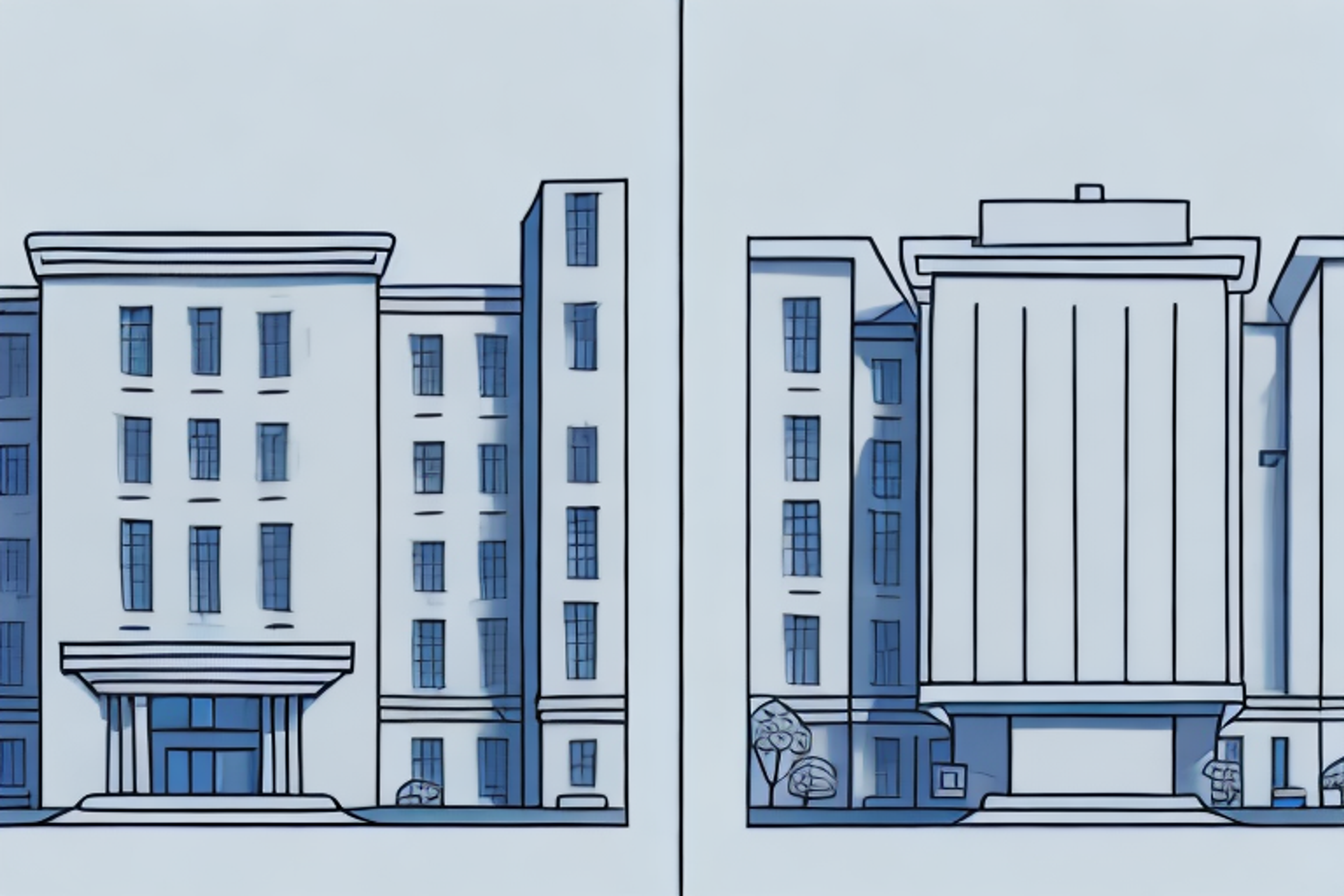Harvard Law School Vs. Columbia Law School: An In-Depth Comparison
Are you considering attending law school but can't decide between Harvard and Columbia? Our in-depth comparison article breaks down the similarities and differences between these two prestigious institutions to help you make an informed decision.
Posted June 13, 2025

Table of Contents
Free Event

Featuring Indrani S.
Law School App Office Hours with a Former Stanford Admissions Officer
Starting Thursday, July 17
11:30 PM UTC · 45 minutes

Featuring Indrani S.
When it comes to pursuing a career in law, choosing the right law school can make all the difference. But with so many options available, it can be hard to decide which one to enroll in. Two of the most renowned and prestigious law schools in the world are Harvard Law School and Columbia Law School. In this in-depth comparison, we’ll take a closer look at both and provide you with all the information you need to make an informed decision about which law school is right for you.
Introduction: The Prestigious Law Schools
Harvard Law School and Columbia Law School are both ranked among the top law schools in the United States and the world. They are both highly selective, accepting only a small percentage of applicants each year. Both schools offer a rigorous curriculum and a wide range of extracurricular activities, as well as access to some of the most respected professors in the field of law.
However, there are some differences between the two schools. Harvard Law School is known for its emphasis on theoretical and philosophical approaches to law, while Columbia Law School is known for its focus on practical skills and hands-on experience. Additionally, Harvard Law School has a larger student body and a more competitive atmosphere, while Columbia Law School has a smaller student body and a more collaborative environment.
Despite these differences, both Harvard Law School and Columbia Law School have produced many successful lawyers and leaders in various fields. Graduates from these schools have gone on to become Supreme Court justices, politicians, CEOs, and more. Attending either of these prestigious law schools can open up many opportunities and pave the way for a successful career in law.
Methodology: How We Compared the Two Law Schools
To provide you with an accurate and comprehensive comparison of Harvard Law School and Columbia Law School, we have analyzed each school’s history, reputation, admissions criteria, tuition fees, curriculum, clinical programs, faculty, student life and extracurricular activities, campus facilities, career services, job placement rates, and alumni networks.
Additionally, we conducted interviews with current students and alumni from both schools to gain insight into their personal experiences and perspectives on the strengths and weaknesses of each institution. We also consulted with legal professionals and experts in the field to gather their opinions on the overall quality and reputation of Harvard Law School and Columbia Law School.
History and Reputation of Harvard Law School
Harvard Law School was established in 1817 and is situated in Cambridge, Massachusetts. It has a rich history of producing some of the most notable figures in the field of law, such as former U.S. President Barack Obama, Supreme Court Justice Elena Kagan, and the founder of the American Civil Liberties Union, Roger Baldwin. Its reputation for academic excellence and intellectual rigor attracts students from all over the world.
In addition to its impressive list of alumni, Harvard Law School is also known for its diverse student body and commitment to public service. The school offers a wide range of clinics and programs that allow students to gain practical experience while serving the community. Harvard Law School also has a strong tradition of scholarship and research, with faculty members who are leaders in their respective fields. Its extensive library, which houses over two million volumes, is one of the largest law libraries in the world.
History and Reputation of Columbia Law School
Columbia Law School was founded in 1858 and is located in the heart of New York City. It is one of the oldest law schools in the country and has a reputation for producing successful lawyers, judges, and scholars. Its alumni include three U.S. Presidents, nine Supreme Court Justices, and countless leaders in business and government.
In addition to its impressive alumni network, Columbia Law School is also known for its rigorous academic programs and diverse student body. The school offers a wide range of courses and clinics, allowing students to specialize in areas such as corporate law, human rights, and environmental law. The student body is made up of individuals from all over the world, bringing a variety of perspectives and experiences to the classroom.
Admissions Criteria for Harvard Law School
Harvard Law School is highly competitive, with an acceptance rate of only 12%. The average LSAT score for admitted students is 173, and the average GPA is 3.9. Applicants are expected to have a strong academic record, extracurricular activities, and letters of recommendation.
In addition to academic achievements, Harvard Law School also values diversity and leadership potential in its applicants. The admissions committee looks for candidates who have demonstrated a commitment to public service, social justice, and community involvement. This can include volunteer work, internships, or leadership roles in student organizations.
Furthermore, Harvard Law School offers a variety of joint degree programs, allowing students to combine their legal education with another field of study, such as business, public policy, or medicine. These programs require additional application materials and may have different admissions criteria, so it is important for applicants to research and carefully consider their options.
Admissions Criteria for Columbia Law School
Columbia Law School is also extremely selective, with an acceptance rate of just 15%. The average LSAT score for admitted students is 172, and the average GPA is 3.8. Applicants are required to submit a personal statement, letters of recommendation, and academic transcripts.
In addition to the required application materials, Columbia Law School also strongly encourages applicants to submit a diversity statement. This statement allows applicants to share their unique experiences and perspectives, and how they would contribute to the diversity of the law school community. The admissions committee also considers factors such as work experience, extracurricular activities, and leadership potential when evaluating applicants.
Tuition and Financial Aid Options for Harvard Law School
Harvard Law School has one of the highest tuition fees in the country, with an annual cost of $68,000. However, the school offers a range of financial aid options, including scholarships, loans, and work-study programs, to help students cover the fees.
One of the most popular financial aid options at Harvard Law School is the need-based grant program, which provides financial assistance to students who demonstrate financial need. The school also offers merit-based scholarships to students who have exceptional academic achievements or unique talents.
In addition to financial aid, Harvard Law School also provides various resources to help students manage their finances. The school's Office of Financial Aid offers counseling and guidance on budgeting, debt management, and loan repayment options. The school also hosts workshops and seminars on financial literacy and career planning.
Tuition and Financial Aid Options for Columbia Law School
Columbia Law School’s annual tuition fee is slightly lower than Harvard, at $66,856. The school also offers financial aid options, including grants, scholarships, loans, and work-study programs, to help students fund their education.
Additionally, Columbia Law School has a robust public interest program that provides funding and support for students pursuing careers in public service. This program includes summer fellowships, loan forgiveness programs, and post-graduate public interest fellowships. Students can also participate in clinics and pro bono projects to gain practical experience while serving the community.
Curriculum Comparison: Core Courses at Harvard vs. Columbia
Both Harvard Law School and Columbia Law School offer a comprehensive curriculum that covers all areas of law. However, there are some differences in the core courses offered at each school. Harvard Law School has a strong focus on legal theory, while Columbia Law School emphasizes practical skills such as trial advocacy and negotiation.
Elective Courses at Harvard vs. Columbia
Both schools offer a wide range of elective courses that allow students to specialize in areas such as environmental law, tax law, and constitutional law. Harvard Law School also offers courses in international law and human rights law, while Columbia Law School offers courses in intellectual property law and corporate law.
Clinical Programs at Harvard vs. Columbia
Both law schools provide opportunities for students to gain practical experience through clinical programs. Harvard Law School has a range of clinics, including the Criminal Justice Institute and the International Human Rights Clinic. Columbia Law School has clinics in areas such as environmental law, immigration law, and human rights law.
Faculty Comparison: Notable Professors at Both Schools
Both Harvard Law School and Columbia Law School have some of the most respected professors in the field of law. Harvard Law School’s faculty includes scholars such as Laurence Tribe, Alan Dershowitz, and Martha Minow. Columbia Law School’s faculty includes scholars such as Elizabeth Warren, Jack Greenberg, and Katherine Franke.
Student Life and Extracurricular Activities at Harvard
Harvard Law School offers a vibrant student life with a range of extracurricular activities, from student-run journals to moot court competitions. The school also has a student affinity group that caters to students from diverse backgrounds.
Student Life and Extracurricular Activities at Columbia
Columbia Law School also offers a rich student life with a range of extracurricular activities, including numerous student-run journals, clubs, and moot court competitions. The school also has a range of affinity groups that support the diverse student population.
Campus Facilities Comparison: Libraries, Tech, Housing, etc.
Both law schools have state-of-the-art facilities that provide students with access to the latest technology and equipment. Harvard Law School’s library is one of the largest law libraries in the world with extensive collections of legal materials. Columbia Law School’s library is also renowned, with over 1.5 million volumes and a range of electronic resources. Both schools provide on-campus housing options for students.
Career Services and Job Placement Rates at Harvard vs Columbia
Harvard Law School and Columbia Law School both have strong career services offices that provide students with advice on career planning, job search strategies, and networking. According to the American Bar Association, Harvard Law School has a 93% job placement rate, while Columbia Law School has a 92% job placement rate.
Alumni Network Comparison: Notable Alumni from Both Schools
Both Harvard Law School and Columbia Law School have produced some of the most successful lawyers, judges, and scholars in history. Harvard Law School alumni include Chief Justice of the United States John G. Roberts Jr., former U.S. President Barack Obama, and Supreme Court Justice Elena Kagan. Columbia Law School alumni include U.S. Senator and former Secretary of State Hillary Clinton, former New York Governor Franklin D. Roosevelt, and Supreme Court Justice Ruth Bader Ginsburg.
Conclusion: Which Law School is the Best Fit for You?
Both Harvard Law School and Columbia Law School are highly respected institutions that offer students a world-class legal education. Choosing which school is right for you will depend on various factors, including your academic record, career aspirations, and personal preferences. We hope this in-depth comparison has provided you with all the information you need to make an informed decision about which law school to enroll in.











